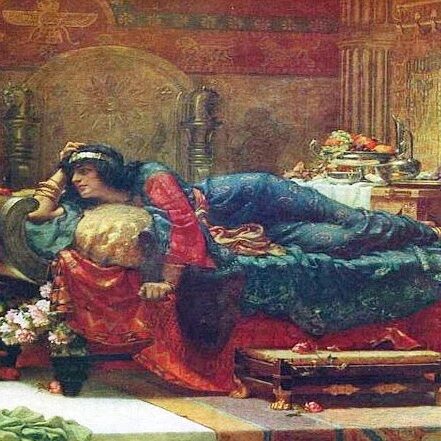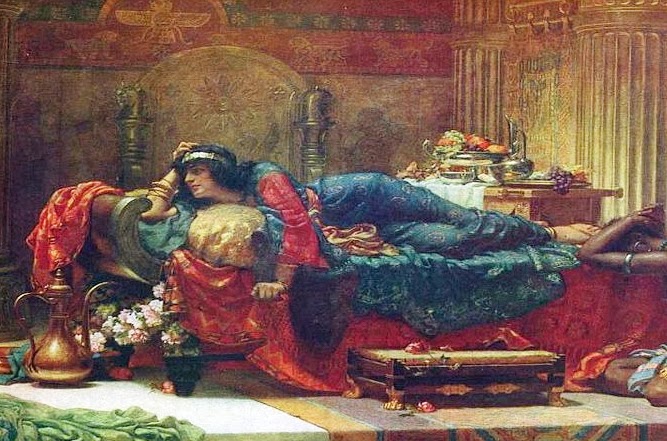Background: 20 BC
King Ahasuerus, the King of Persia held a feast for all the princes and servants of Persia and Media in order to show off his great riches. The feast lasted 180 days. After this feast he held a feast for all the people in the palace which lasted seven days. Vashti, the queen, held a separate feast for the women of the palace in the royal house. One the seventh day of the feast the King was “merry with wine” and commanded his seven chamberlains to bring Vashti out to him so that he could show off her beauty. Vashti refused to come and the King was “very wroth, and his anger burned in him”. He commanded that she never come before him again and that her royal estate should be given to another. He also sent out a proclamation that all wives in the Persian Empire should give honor to their husbands, and that every man should rule in his own house. Esther later became Queen in place of Vashti.
Facts about her:
- She was the Queen of Persia, married to Ahasuerus. Persia encompassed 127 provinces, from Greece to India, almost the whole of the civilized world (see Bible Map 7);
- She was fair to look at;
- Her name means “beautiful“, “sweetheart, or “the beloved one” in Hebrew;
- She enjoyed a high standard of living and had significant political and social power;
- She was responsible for holding a separate feast for the women and nobles of the palace;
- She was summoned by the King’s seven Chamberlains to appear before the drunken King and the drunk men of the palace;
- She refused to come when the King called her, humiliating him before all the men of the palace;
- The King’s wise men told him that “Vashti the queen hath not done wrong to the king only, but also to all the princes, and to all the people that are in all the provinces of the king Ahasuerus. For this deed of the queen shall come abroad unto all women, so that they shall despise their husbands in their eyes…Thus shall there arise too much contempt and wrath.” (Esther 1:17-18)
- The King commanded that she should never come before him again;
- Her royal estate was given to another (eventually Esther);
- Her act of disobedience caused the King to send out a decree throughout his entire empire (published in multiple languages) saying that, “all the wives shall give to their husbands honour, both to great and small” (Esther 1: 20) and “that every man should bear rule in his own house”(Esther 1:22);
- She lost everything because of her disobedience– her political power, her social position, her dignity, her chance to bear children, her friends, and her family.
- The King’s request that she “show off her beauty” might be interpreted to mean that she “appear naked” or “dance”. In verse 11 the King specifies that she wear her royal crown, it might have been that is all he meant for her to wear;
- According to the Midrash, she was the great-granddaughter of King Nebuchadnezzar, the granddaughter of King Amel-Marduk, and the daughter of King Belshazzar;
- Men and women often dined together in ancient Persia, but as the dinner progressed and more wine was drunk, the wives left and were replaced by concubines. She might have felt like she was being treated as a concubine because the King called for her after dinner. She was a noble woman and would not have felt that was respectable behavior for a queen;
- According to the Talmud (Megillah 12) Vashti would force Jewish women to work naked on the Sabbath. The Talmud also says that the reason she refused to appear before the King was not that she was modest, but because she had leprosy or because she had grown a tail;
- The scriptures don’t specify what happened to her, it just says that she would ” come no more before king.” Jewish tradition believes that she was executed, but it is very possible that she was still alive and living as a low status concubine in the palace when Esther became queen.
My Thoughts:
This story is hard for me because I have two conflicting thoughts about Vashti.
 First Thought: I think she is a fantastic example of standing up for your standards. She didn’t allow herself to be forced into doing something she knew was degrading and inappropriate. She took a great risk in standing up to her husband, who tried to control her with unrighteous dominion. She knew how she should be treated and she demanded it. She had strength and courage that I admire. Her story reminds me of a talk by Elder Dallin H. Oaks entitled Priesthood Authority in the Family and the Church (Nov. 2005). In it he says:
First Thought: I think she is a fantastic example of standing up for your standards. She didn’t allow herself to be forced into doing something she knew was degrading and inappropriate. She took a great risk in standing up to her husband, who tried to control her with unrighteous dominion. She knew how she should be treated and she demanded it. She had strength and courage that I admire. Her story reminds me of a talk by Elder Dallin H. Oaks entitled Priesthood Authority in the Family and the Church (Nov. 2005). In it he says:
President Kimball…declared, “We have heard of men who have said to their wives, ‘I hold the priesthood and you’ve got to do what I say.’ ” He decisively rejected that abuse of priesthood authority in a marriage, declaring that such a man “should not be honored in his priesthood” (The Teachings of Spencer W. Kimball, 316).
There are cultures or traditions in some parts of the world that allow men to oppress women, but those abuses must not be carried into the families of the Church of Jesus Christ. Remember how Jesus taught: “Ye have heard that it was said by them of old time, … but I say unto you …” (Matt. 5:27–28). For example, the Savior contradicted the prevailing culture in His considerate treatment of women. Our guide must be the gospel culture He taught.
If men desire the Lord’s blessings in their family leadership, they must exercise their priesthood authority according to the Lord’s principles for its use: “No power or influence can or ought to be maintained by virtue of the priesthood, only by persuasion, by long-suffering, by gentleness and meekness, and by love unfeigned; By kindness, and pure knowledge” (D&C 121:41–42).
Vashti was the victim of an unrighteous husband who tried to control her and abuse her. It is not right for women to be treated that way, and she did well to stand up to him and assert her rights as a daughter of God.
Second Thought: Both Vashti and Ester disobeyed the king, yet they did so in very different ways.
- Vashti refused to come when the king called her/ Esther went to the king when she wasn’t called;
- Vashti offended and humiliated her husband with her disobedience/Esther pleased and empowered her husband with her disobedience;
- Vashti’s disobedience resulted in her banishment/ Esther’s disobedience resulted in giving her more freedom and more power as a queen;
- Vashti’s way of disobeying led to more restrictions and control over women in the empire/Esther’s way of disobeying saved the lives of all the Jews in the empire and elevated their status in the eyes of the king.
I can’t help but feel that while Vashti had a VERY valid reason for disobeying her husband, she might have done it the wrong way. She was haughty, forceful, blunt, and undiplomatic. Her disobedience didn’t do much to help women’s situation in the Empire, it made it much worse for them. True, her situation was different than Esther’s, but Ester used all her feminine resources to get what she needed. She used her beauty, her brains, her charm, and quite a bit of prayer and fasting to change the mind of her husband and gain respect.
Sometimes I think that women do more harm to their causes when they are forward, overbearing, and forceful. It seems like most of the time they are more effective when they use more gentle, “feminine” ways of persuasion. Sometimes that means wearing a pretty dress and hosting parties for the king until he is willing to listen to you. Sometimes it means humbling yourself and coming when you are called. Yet on the other hand, there are times when “feminine” techniques fail, and sheer willpower, force, stubbornness, and courage are required to stand up for what is right.
So you see, that is my dilemma about Vashti. I can’t decided if her way or Esther’s way is better–or maybe they are just different. Perhaps there are times when women need to be Vashtis and times when they need to be Esthers.
What we can learn from her:
- Life has gotten better for most women since 20 BC, well most women. There are still women living in parts of the world where things haven’t changed very much;
- Sometimes women have to disobey what is demanded of them if it unrighteous, even at the risk of being cast out and punished;
- Women suffer from unrighteous dominion;
- Sometimes there is a better, gentler way to disobey and still get what you want.
- What is a modern day parallel of Vashti’s story?
- What do you think women today have to learn from Vashti?
- Would you have come when the king summoned you? Why/ Why Not?
- What do you think happened to Vashti?





My favorite part is always "My Thoughts." Thank you for sharing your powerful spiritual insights, Heather!
I just found your blog! I LOVE it!! I hope you dont mind that I linked it to mine! Thank you!
Thank you for your post. My only thought is that it's important not to blame Vashti for her husband's choices. She may have known he was a jerk, but she still could not have foreseen his specific response. It was a bad situation, and there may not have been any good option available for her. It's also possible that Esther, in the same situation, might have done the same thing.
"Perhaps there are times when women need to be Vashtis and times when they need to be Esthers."
I have wonder if the difference is personal revelation. It's so hard to know if the situation you are in calls for charm and humility, or firmness and agression. But God always knows, and if we let him, he will let us know. Maybe the difference between Vashti and Esther is simply that Vashti made her own choice, and Esther was lead by the spirit.
Thanks for your thoughts. Perhaps The Lord needed both women as instruments in His hands to do two different things. Perhaps if Vashti had asked for freedom for the Jews it wouldn't have had the same outcome/effect. Both seem to have had very specific purposes in their courageous actions. And perhaps it was more like Elder Holland says, (paraphrase) often times our struggles aren't for The Lord to lean about us, but for us to learn about ourselves.